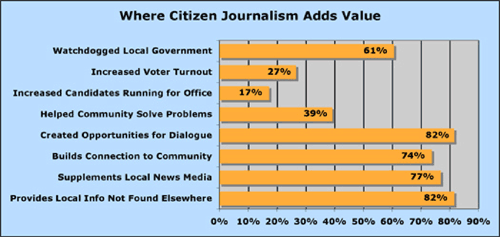Originally published in the Winter 2007 issue of Harvard University’s Nieman Reports.

In rural Dutton, Montana, 80 people showed up last fall, wooed by a notion of starting a local news site for this newspaperless town of 375 people. Months later, the community celebrated the launch of the Dutton Country Courier, DuttonCC.org.
In Chappaqua, New York, three long-time community volunteers decided their community needed a weekly online newspaper. They took matters into their own hands and in early October launched NewCastleNOW: News & Opinion Weekly.
Meanwhile in Moscow, Idaho, low-power KRFP-FM radio, just two years after it began airing a citizen-produced nightly newscast on radiofreemoscow.org, is applying for a commercial radio license.
All three of these citizen media projects were fueled in small part by micro grants from the J-Lab/Knight Foundation New Voices program, but they are being sustained in much larger part by the passion, vision and hard work of their creators.
From girls podcasting in the Lower East Side of Manhattan, to environmental journalists creating a wiki about the Great Lakes, to journalism students scooping Chicago news outlets, in two years some 30 New Voices start-ups have joined scores of other hyperlocal ventures in committing “random acts of journalism.”
It is here – on these hyperlocal sites – that the systemic conventions of inverted pyramids and “balanced” stories are out of sync with information conveyed amid a keen caring about community. “These are not multiple-source stories,” said veteran journalist Suzanne McBride of the items on CreatingCommunityConnections.org, which she cofounded in Chicago. “It took me a while to say that’s okay; it’s not libeling anyone. I had to change my thinking about that,” she told a Citizen Media Summit at The Associated Press Managing Editors’ conference in October.
Nonjournalists sharing photos and videos of breaking news events – from the London bombings to the South Asia tsunami – garners media attention, yet what’s happening on emerging hyperlocal news opens a window to observe what is happening in journalism today. In communities with little news coverage, people are using the Web to restore a sense of place. Behind these hyperlocal efforts is a desire to get local citizenry engaged in issues affecting their lives – in essence, to create a civic media that at the same time constructs a new architecture of participation in their towns.
Learning curves at many of these Web sites are still high, but those of us who observe and research these efforts already know a lot. Earlier this year, J-Lab released one of the first reports on the rise of local news sites based on user-generated content (UGC). The research, “Citizen Media: Fad or the Future of News?” reported on survey responses from 191 citizen media participants and on in-depth interviews of the founders of 31 websites.
Here are some of the key findings:
- Citizen media is emerging as a form of “bridge media,” linking opportunities to share and create news and information media with opportunities to get involved in civic life.
- No one size fits all; there are many models. Sites have been started by former journalists seeking to be the I.F. Stones of their towns and by friends of the public library seeking to construct a local newscape.
- Instead of being comprehensive sources of news, sites are forming as fusions of news and schmooze. Stories unravel over a series of postings and people, contrary to traditional journalistic conventions, “cover” the topics they care most about and know something about.
- Half the respondents said their sites don’t need to make money to continue. Costs can be as low as $13 a month for server space, and volunteers provide most of the labor. But site founders concede it would be nice to be able to pay a little to contributors.
- Most citizen sites don’t use traditional metrics—unique visitors, page views or revenues—to measure their success. Yet 73 percent pronounced their efforts to be “successful.”
- Success is often defined as impact on the community. Site owners say their sites they have increased voter turnout in elections and upped attendance at town meetings. They have helped their communities solve problems and watchdogged local government.
- There is a high degree of optimism that citizen news sites are here to stay. But site founders say that attracting more contributors and some operating support continue to be major challenges.
With the rise of so many independent local news sites, traditional news outlets are now trying to enter this space with their own iterations of UGC sites, such as the Chicago Tribune’s TribLocal.com and The Washington Post’s LoudounExtra. For the most part, news organizations are starting from scratch in developing their hyperlocal news sites rather than partner with existing ones. It remains to be seen whether the sites affiliated with news outlets will achieve the passion and caring for community exhibited by the independent startups.
Some citizen media site operators think such competition is senseless. “We are plankton,” says iBrattleboro.com cofounder Christopher Grotke. He’d like to see news organizations feeding off his site – and others like it – rather than trying to replicate what it already does.
It remains to be seen whether sustainable business models will emerge from the numerous citizen media efforts now online. Perhaps they will become a venue for a new type of community volunteerism, something baby boomers do after they have finished coaching their kids’ soccer teams. But it’s increasingly clear that citizen media sites are helping to transform how local journalism is practiced and even what it is and what it can do.
From his perch at MyMissourian.com, Clyde Bentley believes that “traditional journalism plus citizen journalism equals 21st Century journalism.” I agree.
For those seeking to venture into this sphere, whether affiliated with a news organization or not, we offer these tips:
- Get ready for a high-touch enterprise. If you build a local news site, citizen journalists will not come unless they are cajoled, recruited, trained, stroked, celebrated, and sometimes paid. Content wranglers must be evangelists, cheerleaders, assignment editors and writers. Travis Henry, top editor of YourHub.com, has taken Denver-area contributors to Broncos games and has been known to make house calls to teach someone how to load to the site. In Dutton, University of Montana journalism students coauthored early stories with local contributors to help build confidence. And when MyMissourian.com founder Clyde Bentley discovered that a local bluegrass band got a grant to go to China, he “gave them an old computer, set them up a blog and a Flickr account.” They sent me e-mails and I posted all of their material. “We got incredible readership on this thing and we all saw more of China than we ever would,” he said.
- Understand contributors’ motivations. Robust user-generated content demands some equilibrium between the giving and the getting. Volunteers will write or report if they are getting something in return. What motivates them? Maybe they want to learn tech skills, get a real journalism job, make a difference in their community or solve a problem. Said one citizen reporter for The Forum (forumhome.org) in Deerfield, N.H.: “My experience working as a Forum reporter has been one of the best experiences of my life. At times, I feel used, overworked, and run out of words in my head to place on the screen. But it is all worth it in the end.”
- Model the content you want. Seed your site with the kind of stories you hope others will contribute. Write a mission statement. For instance, BlufftonToday.com promises to provide a “friendly, safe, easy to use place” on the Web for people to post and share. “… In return, we ask that you meet this character challenge: be a good citizen and exhibit community leadership qualities. It’s a simple and golden rule. Act as you would like your neighbors to act. “We’ve had almost no complaints about inaccurate information,” said iBrattleboro cofounder Lise LePage. “Citizen journalism is always going to be advocacy. They attend a meeting because they have a reason for being there, but that doesn’t mean their coverage is going to be inaccurate.”
- See and be seen. Invest in face time in your community. Attend meetings, state fairs and sports events. “Most of the community stories come from my going out and relentlessly talking to people,” said Barb Iverson, CreatingCommunityConnections.org’s other co-founder. Added Mark Potts, founder of the now-shuttered Backfence.com, “It’s the garden club. It’s the stoplight down their street that isn’t working or the principal who’s been fired. If you don’t live there, you don’t care.”
- Tap existing assets. Pay attention to what the community tells you is important. When The [Bakersfield] Californian launched Bakotopia.com, local bands made it the place to share information about local musicians. Bicycling is such a popular Chicago pastime that bikers insisted their pursuit be a separate “beat,” apart from “transportation,” on CreatingCommunityConnections.org.
- Open doors for participation. iBrattleboro.com has an Assignment Desk that seeks volunteers to cover town meetings and events. Appalshop radio trains community correspondents to produce news stories for the air (http://www.appalshop.org/ccc). NewWest.net offers writers their own “MyPages.”
- Rethink “news.” Citizens define news very differently from traditional news outlets. They don’t engage in scorecard journalism: Who’s up or who’s down today? The Democrats or the Republicans? They don’t balance stories with false equilibriums; if someone is in favor of something, they won’t run around to try to find someone who’s against it. And, importantly for the community, they don’t require conflict before there’s a story. They validate consensus as well. For some sites, it’s enough to run the minutes of a town meeting.
- Partner for link love. When CreatingCommunityConnections.org found Chicago aldermen hiring their relatives, the editors offered to also break the story on The Beachwood Reporter (beachwoodreporter.com) to help juice traffic and impact. Most news organizations consider it unthinkable to share enterprise stories.
- Don’t sweat the math. Appalshop trained 13 producers, but only five are regularly producing. MadisonCommons.org has trained more than 70 citizen journalists, but only a handful contribute. It’s common to have fewer than 10 percent of those who agree to contribute actually do it.
- Build the business as it comes. The editors of Baristanet.com will barter ads for hair care and dry cleaning. NewWest.net supports activities with revenues from an indoor advertising company. TCDailyPlanet.org has attracted grants from several community foundations.







Comments are closed.